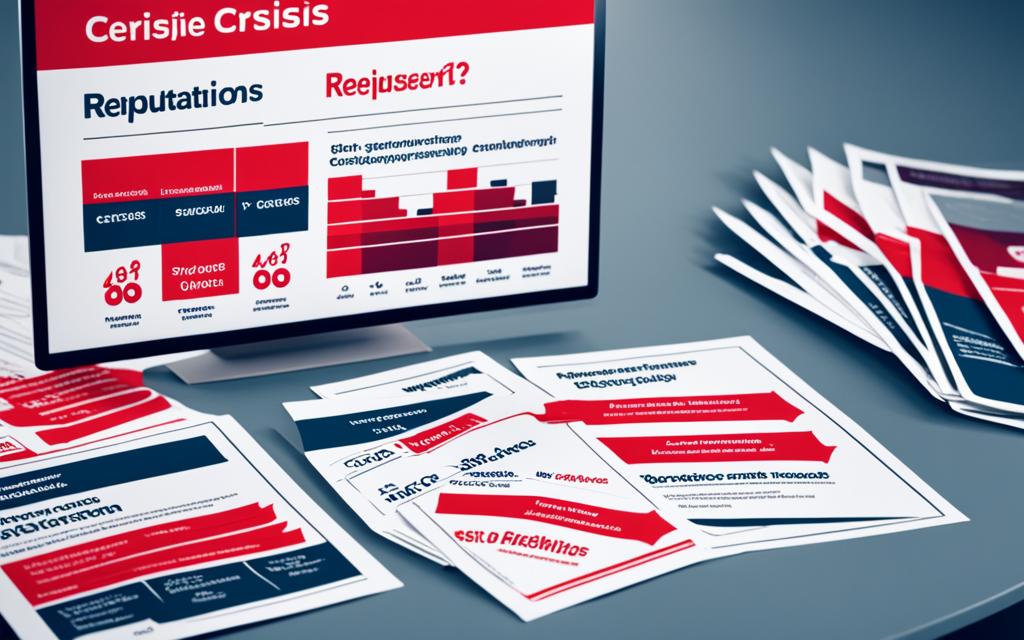In the unforgiving world of doing business in 2024, brand reputations are not just hard-fought and earned, but shockingly easy to see damaged. Often at a moment’s notice and by anyone in possession of a smartphone and an axe to grind. For enterprise-sized companies, the stakes are highest; a single (perceived) public misstep can give rise to scrutiny, investor distrust and customer loyalty downsides. However, corporations across industries have shown an uncanny ability to not only weather reputational storms, but emerge from challenges even stronger than before. This article will examine 10 famous case studies of companies that navigated devastating reputation crises and provide insights into how Reputation Return’s crisis management solutions can protect your brand and restore trust during challenging times.
Key Takeaways
- Reputation crises can strike any business at any time, but with the right crisis management strategies, companies can emerge stronger than before.
- Reputation Return’s comprehensive crisis management solutions help protect brands and restore trust during challenging times.
- Understanding the components of corporate reputation and identifying potential crises is crucial for effective brand protection.
- Developing a comprehensive crisis management plan and leveraging technology are essential for navigating reputation crises successfully.
- Effective crisis communication, including engaging with social media platforms, can make or break a company’s ability to weather a reputational storm.
The Importance of Reputation Management
A strong reputation is a brand’s most valuable asset. It shapes public opinion and influences customers’ buying decisions. Brand reputation is the perception and attitudes consumers and other stakeholders hold about a brand’s products, services, and overall corporate identity. This reputation is forged by the brand’s historical actions, marketing strategies, consumer experiences, and how the company handles itself publicly and privately.
Defining Brand Reputation
Brand reputation is the collective perception and attitudes that customers and stakeholders have about a company’s brand. It encompasses the trust, quality, and responsiveness a brand is known for. Maintaining a positive brand reputation is crucial for securing consumer trust, bolstering market position, and protecting a company’s long-term success.
Components of Corporate Reputation
- Trustworthiness – How reliable and honest a brand is perceived to be.
- Quality – The perceived value and excellence of a brand’s products or services.
- Responsiveness – The speed and effectiveness with which a brand addresses customer needs and feedback.
Good reputation management is essential for upholding a brand’s integrity, nurturing customer satisfaction, and strengthening its market standing. By proactively addressing reputation risks and reinforcing positive brand perceptions, companies can unlock long-term success and growth.
Identifying Potential Crises
As a savvy business leader, the best way to approach crisis management is to learn to recognize potential issues and brand crises before they escalate. By staying vigilant and leveraging advanced tools, you can minimize the detrimental effects of negative media coverage and public backlash.
Types of Brand Crises
Companies may face a variety of brand crises, including Financial Crises, Legal Crises, Organizational Crises, Technological Crises, and Natural Crises. Early detection of these potential threats is crucial to managing the crisis effectively and safeguarding your brand’s reputation.
Using Listening Tools
To stay attuned to public sentiment and identify emerging crises, you can utilize a variety of listening tools. Social media monitoring platforms like Brandwatch track brand mentions across social networks, while customer feedback tools provide direct insights into customer satisfaction. Additionally, media monitoring services keep track of your brand’s media coverage, allowing you to stay on top of the narrative.
By leveraging these powerful tools, you can better identify and manage potential crises early on, transforming your organization into a proactive navigator during unforeseen challenges.

| Crisis Type | Examples |
|---|---|
| Financial Crises | In 2018, British newspaper The Sun withdrew its sports betting brand Sun Bets following a $63m (£51m) loss in just two years. |
| Technological Crises | In 2024, Volkswagen recalled 260,000 vehicles over fuel tank issues. |
Equipping your organization with the right tools and strategies for crisis identification is essential for long-term success and resilience against future threats. By staying vigilant and proactive, you can position your brand to navigate even the most challenging situations with confidence and agility.
Developing a Crisis Management Plan
Preparing for potential crises is crucial for any business. The first step in crisis management is to develop an effective crisis management plan that outlines responsibilities and communication strategies. At the heart of this plan is a designated crisis response team comprising members from various departments, including executive leadership, public relations, legal, and human resources.
Role of the Crisis Team
The crisis response team plays a vital role in guiding your organization through a brand crisis. Their responsibilities include:
- Providing overall direction and strategic leadership
- Managing media relations and internal communication with employees
- Advising on legal implications and compliance requirements
- Coordinating the organization’s response and recovery efforts
By having a well-defined crisis management plan and a dedicated crisis team in place, your business can respond swiftly and effectively to unexpected events, minimizing damage to your reputation and ensuring business continuity. Reputation management services can also play a crucial role in helping you navigate and recover from a crisis.
| Key Elements of a Crisis Management Plan | Benefits of a Crisis Management Plan |
|---|---|
|
|
crisis management solutions
When facing reputational challenges, businesses require comprehensive crisis management services to navigate turbulent times and protect their brand. Reputation Return offers a robust suite of solutions tailored to address the unique needs of organizations in crisis.
Their crisis management solutions encompass a range of strategic services, including risk assessment, crisis planning, real-time monitoring, sentiment analysis, and targeted communication strategies. By partnering with Reputation Return, companies can effectively identify potential threats, develop robust crisis response plans, and execute impactful communication strategies to safeguard their brand’s reputation.
Reputation Return’s crisis management expertise is backed by decades of experience. CS&A International, a leading crisis management firm, has been enhancing crisis resilience for clients since 1991. Their offerings include the CrisisEcademy™, which provides crisis management training and scenario-based exercises developed by experts with over 30 years of experience.
Additionally, Reputation Return leverages the crisis management capabilities of industry leaders like Deloitte. Deloitte’s crisis simulations help organizations identify potential gaps in their crisis readiness, while their rapid-action teams provide tailored support within 24 hours of any event. Deloitte also offers 24/7 monitoring to track potential business disruptions and post-crisis developments.
In today’s fast-paced digital landscape, effective crisis communication is crucial for managing stakeholders and protecting an organization’s reputation. The first few minutes of a crisis can dictate the subsequent hours, highlighting the importance of a swift and strategic response. Reputation Return’s crisis management solutions empower businesses to navigate these critical moments, safeguarding their brand’s value and ensuring long-term success.
| Service | Benefit |
|---|---|
| Risk Assessment | Identify potential threats and vulnerabilities to proactively mitigate risks. |
| Crisis Planning | Develop robust crisis response strategies to ensure a coordinated and effective reaction. |
| Real-time Monitoring | Continuously track and analyze online conversations to detect emerging issues. |
| Sentiment Analysis | Gain insights into public perception and sentiment to guide communication efforts. |
| Strategic Communication | Craft and execute targeted communication strategies to protect and restore the brand’s reputation. |

By leveraging Reputation Return’s crisis response strategies and brand protection expertise, businesses can navigate reputational challenges with confidence and emerge stronger than ever. Their comprehensive reputation management services empower organizations to safeguard their brand’s reputation, enhance their competitive edge, and ensure long-term success.
Executing Crisis Communication
When confronted with a brand crisis, having a well-formulated crisis communication plan is essential. This plan should address key message development, response protocols, stakeholder engagement, and media training for designated spokespersons. By preparing clear, concise messaging and a step-by-step action plan, companies can ensure consistent communication with all major stakeholders, including customers, investors, and the media.
Formulating the Crisis Communication Plan
A robust crisis communication plan is the foundation for effective crisis response. This plan should outline the following key elements:
- Clear messaging and response protocols
- Identification and prioritization of key stakeholders
- Designation of authorized spokespersons and media training
- Procedures for real-time social media crisis management and community engagement
- Processes for real-time monitoring and rapid issue identification
By addressing these critical components, companies can ensure a coordinated, transparent, and effective response during a brand crisis.
Engaging with Social Media Platforms
Social media channels are critical for real-time monitoring and response during a brand crisis. Companies should track brand mentions and relevant hashtags, utilizing social listening tools for instant alerts on potential issues. When engaging with the public on social media, it’s important to be transparent, responsive, and consistent in all communications, while also managing the online community engagement appropriately.
The importance of effective crisis communication cannot be overstated. By proactively developing a comprehensive plan and leveraging social media platforms, companies can navigate the complexities of a brand crisis and emerge stronger than ever.
Leveraging Technology
In today’s digital landscape, technological tools have become indispensable in managing and mitigating corporate crises. Reputation Return’s crisis management solutions leverage cutting-edge technology to provide organizations with real-time insights and swift response capabilities.
Sentiment analysis, powered by natural language processing, is a game-changer in quantifying public perception. Tools like Brandwatch and Lexalytics analyze online conversations to categorize them into positive, neutral, or negative sentiment, enabling companies to proactively address emerging issues and protect their brand reputation.
Real-time monitoring systems, such as Hootsuite and Google Alerts, track brand mentions across digital channels and provide immediate notifications of spikes in activity. This ensures that organizations can react promptly to potential crises, minimizing the impact on their reputation.
| Technology | Application | Benefits |
|---|---|---|
| Sentiment Analysis | Quantifying public perception | Proactive issue identification and management |
| Real-time Monitoring | Tracking brand mentions and spikes in activity | Prompt crisis response and mitigation |
| Crisis Management Software | Automated alerts, customizable dashboards, and predictive analytics | Proactive risk identification and mitigation strategies |
Crisis management software, such as those offered by Reputation Return, takes this a step further. These platforms provide automated alerts, customizable dashboards, and predictive analytics to help organizations identify potential risks and develop effective mitigation strategies.
By leveraging the power of technology, companies can stay ahead of the curve, detect emerging issues early, and respond swiftly to crises, ultimately protecting their hard-earned reputation.
Conclusion
In today’s hyperconnected world, your brand’s reputation is your most valuable asset. A single misstep or public relations disaster can quickly tarnish the hard-earned trust you’ve built with your customers and stakeholders. However, as the case studies in this article have demonstrated, companies that invest in comprehensive crisis management solutions can not only weather reputational storms but emerge from them stronger than before.
By partnering with Reputation Return, your brand can proactively identify potential threats, develop robust crisis response plans, and execute targeted communication strategies to safeguard your reputation. Their cloud-based platform offers the scalability, real-time updates, and advanced security features you need to effectively manage crises in today’s dynamic business environment.
In a world where 69% of business leaders have experienced a crisis over a 5-year period, with an average of 3 crises per organization, having a trusted partner in reputation management and crisis response can make all the difference. Embrace the power of technology, leverage the expertise of professionals, and safeguard your brand’s most valuable asset – your reputation.

